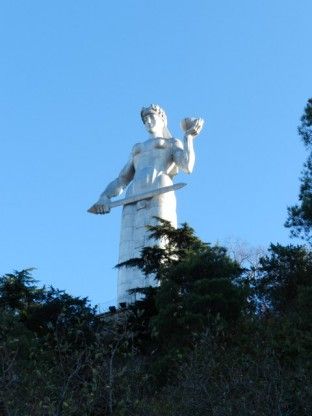Georgian Puzzle
[ text by Andrzej Fedorowicz, photos by Anna Ochmann ]
For the last eight years under President Saakashvili, Georgia has been an example of an immensely successful country. A corrupted and declining post-Soviet state, ruled by local cliques, during a decade transformed itself into a modern country, governed by young and dynamic leaders. The numbers speak for themselves: the leap from the 112th to 12nd place in the World Bank Ease of Doing Business Rank (Poland is in the 70th place). The country tripled its national income and moved up 70 positions in the Transparency International anti-corruption ranking. Today in Georgia you can order an ID or a driving licence without leaving your car, just like you order a hamburger at McDrive, and the document will be ready in several minutes.
Micheil Saakashvili’s position was not even weakened by the defeat in the war with Russia in 2008 and the loss of one-fifth of the country’s territory. It was not a secret to anyone that the President, whose term expires on 1 December 2013, was preparing himself to apply the “Putin variant”. With the support of the deputies of his own party- the United National Movement- he managed to amend the constitution so that after the expiry of the second term, the power would be automatically transferred to the Prime Minister – the position hopefully occupied by the former president Micheil Saakashvili. But on the election day, 1 October 2012, these plans collapsed. Almost overnight Georgians changed their sympathies and voted for the Georgian Dream a party established only 2 years ago by the billionaire Bidzina Ivanishvili. Although Saakashvili will still rule the country for the next year, in December 2013 he will have to hand the power over to his biggest opponent. What had happened that made Georgians turn away from the president who so changed their country and until recently enjoyed such immense popularity?
Caucasian Dr Jekyll and Mr Hyde
The first face of President Saakashvili is well known. On 22nd November 2003 a 23-year-old lawyer bursts into the Parliament, leading a group of young people protesting against the fraudulent election. The oppositionists were carrying flowers so the events were later called the Rose Revolution. It resulted in Eduard Shevardnadze’s resignation and calling a new election. In January 2004 Saakashvili was elected the new president receiving 96 percent of the vote.
The country he was about to govern was in ruin. The regions were ruled wilfully by local chiefs. Corruption, especially in the police reached a record high even for the post-Soviet standards. Having received the overwhelming support, Saakashvili did not want to take small steps to reform the country. He went the whole way.
The police, the army and most state offices were dissolved and built again from scratch. 80 percent of state employers were dismissed and replaced with young and energetic thirty-year-olds. Soon the forty-year-old Saakashvili - one of the youngest presidents in the world – became one of the oldest officials in his country.
The young government with the US-educated president (Columbia University Law graduate) soon became the favourites of George Bush’s administration. An influx of investments, cheap loans, grants as well as advisors and experts started to pour into Georgia. The USA had clear objectives – to win an ally in the former Soviet zone of influence and to prove that the American economic and political model may be applied even in such an “exotic”, post-Soviet country as Georgia.
Saakashvili’s administration, fascinated by the opportunity to create “a small America” in the Caucasus willingly adopted an strictly liberal economic system. Taxes were reduced and simplified. Custom duties - abolished. Most control institutions - liquidated. State property - sold. Labour law was drastically liberalised making it virtually impossible to enter into collective agreements or to establish trade unions. The state withdrew from the social sector, which was symbolised by the complete privatisation of the health service.
The result? In the years 2004-2008 the gross domestic product increased by 12-13 percent every year. The national income per capita doubled. The ubiquitous corruption ceased to be a problem and glass-wall offices and police stations through which citizens could watch the work of state functionaries became the symbol of new Georgia. The country became independent from Russian gas, and guaranteed itself 80% of supplies from Azerbaijan. From the importer of Russian electricity Georgia turned into an exporter of electrical energy to all four neighbouring countries.
Confronted with such successes, most Georgians were inclined to support the president despite the loss in the war with Russia or the attempts to suppress opposition protests. It looked as if nothing could change the attitude of the majority of Georgians towards the presidential administration. Until 18 September 2012.
On that day two TV stations – Maestro and Channel 9 – broadcast shocking images from prison 8 in Tbilisi. The footage showed tortured prisoners who begged for mercy while being raped with rubber truncheons. The author of the film was Vladimir Bedukadze – a former prison guard inspector who is today seeking political asylum in Belgium. In his interview for Channel 9 he stated that tortures are a routine practice in many Georgian prisons, tolerated by the state authorities and the President himself.
The ‘tapes of truth” came as a big shock. Both the international public opinion and Georgian themselves realised that the human right violation was a terrible price the country paid for its political and economic success. Suddenly many remembered the so far ignored reports of Giorgi Tugushi, the Georgian Ombudsman who had been alarming that Georgia had one of the highest proportions of imprisoned citizens. Only in 2011, 114 people died in prisons, 86 of whom in capital prison no. 8. The second, and until then, unknown face of President Saakashvili turned out to be hideous.
Quiet billionaire
11 years Saakashvili’s senior, Bidizna Ivanishvili is more than a local rich man. His fortune is estimated at 7-8 billion dollars which represents a half of Georgian gross national product and places Ivanishvili in 183rd position on the Forbes World’s Richest People List (in comparison – Jan Kulczyk – the richest Polish businessman occupies the 442nd place with the fortune of 3 billion dollars). However, unlike other billionaires Ivanishvili avoided publicity and did not show off his private life. He even did not want the media to publicize his charitable actions. But it was that “quiet billionaire” who decided to challenge Saakashvili.
Ivanishvili made his fortune in the early 90s in Russia. He began with phone production and after 20 years he became a powerful player in the banking sector. He changed his citizenship to Russian. A mighty oligarch, he was involved in the Georgian economic transformation by Saakashvili’s government, which granted him Georgian citizenship and persuaded him to move part of his business to his homeland. Ivanishvili was given the freedom to operate in Georgia as well as the condition not to engage in political activity. And this is the very condition he broke in October 2011 by starting the social movement Georgian Dream. Why did he do that? No one knows. Neither he nor his circle has ever explained in a convincing manner what the billionaire’s motives were. But very quickly, various groups opposing Micheil Saakashvili started to gather around him. The effects came very quickly.
First his Georgian citizenship was taken away from him by a special decree. This was just but a beginning of his harassment. Soon, the National Bank of Georgia requested an audit of the chain of his Cartu banks. The Police began confiscating big amounts, transported from one branch to another, accusing the branch employees of money laundering. In June 2012 the court in Tbilisi sentenced him to a fine of 74 million lari (48 million dollars) for alleged illegal financing of a Georgian Dream election campaign. A media campaign was launched which portrayed Ivanishvili as a Russian secret agent. His wife Ekaterina Kvedelidze – Ivanishvili got into trouble when the police confiscated thousands of satellite dishes which she was distributing among the poorest Georgian citizens in order to let them watch the Channel 9 TV station. It was the same broadcast company which later showed the compromising footage. Were Ivanishvili’s people responsible for revealing the tortures of prisoners in prison no.8? It is very probable. No matter whose idea it was, the blow to Saakashvili’s party was severe. Until 18 September 2012 the United National Movement enjoyed 37-percent support. The Georgian Dream could count on 12 percent of the vote. The rest of the voters were undecided and it was them that, after seeing the shocking material, determined the results of the election.
The Georgian Dream won 55.8 percent of the votes which gave it 85 seats in the Parliament and the United National Movement with 65 seats became an opposition party. Bidzina Ivanishvili was nominated the Prime Minister (he regained his citizenship after the intervention of the Patriarch of Georgian Orthodox church to which he had made generous donations). And this is him, not the current President who will assume the full power next year.
Which way will Georgia go?
At the time being, Ivanishvili acts carefully – a few positions in the new government have been offered to current Saakashvili’s ministers. The opponents are testing each other, but until now, with respect for the constitutional procedures. This is a unique situation in Georgian history – as in the past, the changes of government took place by way of putsches or revolutions. The country seems to have passed the democracy test although the new government’s foreign policy is still difficult to predict.
Ivanishvili makes no efforts to conceal that he wants to establish normal relations with Russia with which Georgia is formally at war. That should be looked at favourably by both the USA and the European Union. Micheil Saakashvili has been frequently (although quietly) accused by diplomats of thoughtlessly succumbing to Russian provocation and getting involved in an armed conflict, which postponed Georgian access to NATO to some indefinite time in the future. Although in difficult moments the USA aided Saakashvili with the amount of 4.5 billion dollars which saved the country’s economy from crisis, the President himself has become a rather unwanted guest in Washington. It was a painful change: while George Bush met him officially five times, Barack Obama did it only once.
Offended, Saakashvili changed course and turned to the EU. However, there were also problems. As he admitted in an interview: “The cooperation with the European is difficult. It is a massive bureaucracy. We have liquidated 90% of all these sanitary inspectors, licences and permits. But they keep asking us, whether we have officials to deal with such matters, just like they do. You don’t? So you need to appoint them. And then we say – we are sorry but we do not regret not having these parasites anymore.”
Ivanishvili faces great challenges. Will he manage to come to an agreement with Russia? Will he be accepted by Americans? Can he cooperate with the EU? Will his business engagement in Russia make him a hostage to that country, submissive and prone to pressure? Will the richest Georgian in the world resist the temptation to transform the country into his own property? And finally, will Saakashvili not resort to unconstitutional solutions during his last year in office? The answers to these questions will determine whether the Georgian experiment – a unique phenomenon in this part of the world- will last. No matter how the Georgian puzzle will be solved, the country has already sent a clear message to the world. No economic and political success, even the biggest one, can justify a violation of basing human rights.
Artykuł ukazał się w magazynie BEDRIFT jesień 2012.



